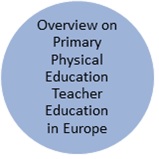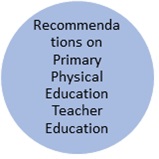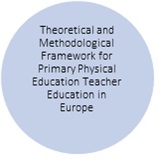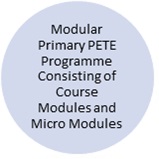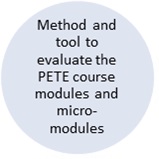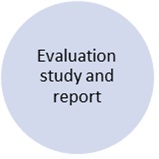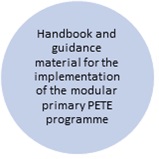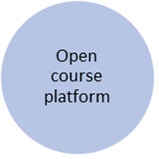Theoretical and methodological framework for primary Physical Education Teacher Education

Aim of the intellectual output
- Bring together European HEIs and other stakeholders active in primary PETE, to promote their cooperation and state suggestions to qualify PRIME PETE.
Provide theoretical and methodological guidelines for a modular study programme for Primary PETE based on the previous findings and recommendations from PRIME PETE IO#1-3.
Situation
Generalist primary school teachers teach all subjects of the curriculum in many countries while other countries have PE specialist teachers, which in some countries even support generalist teachers.
Broad aspects
- A variety of learning theories can be used to define study programme!
- Competent, analytically reflective, professionally effective PE teachers and cognisant of one’s health and well-being.
SUCCESSFUL GRADUATES:
- Specific competences
- Reasoned rational argument for the long-term benefits of PE.
- Evolutionary, critical approach to its place in the educational process.
STUDY PROGRAMMES:
- Well-adjusted combination of theoretical, practical and professional work
- Practical activities, educational and teaching sciences, natural and biological sciences, social sciences/humanities, scientific work and school-based teaching practice
- Universal Design for Learning (UDL) as a methodological framework for the design of courses.
- Elements (modules) can be organized into themes to provide a structure for programmes.
- Personal health and wellbeing as well as effective communication should not be neglected.
PRIMARY PETE Model
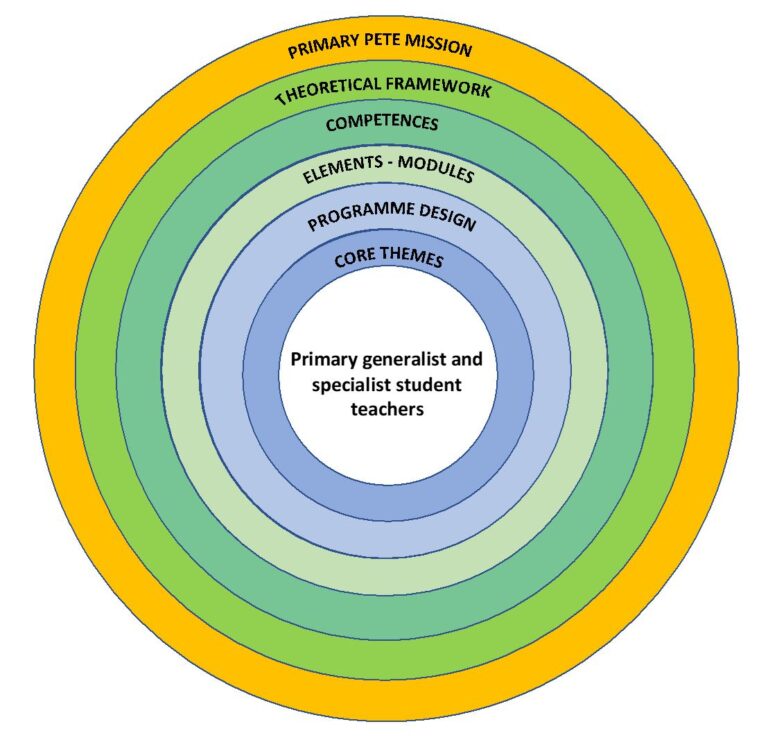
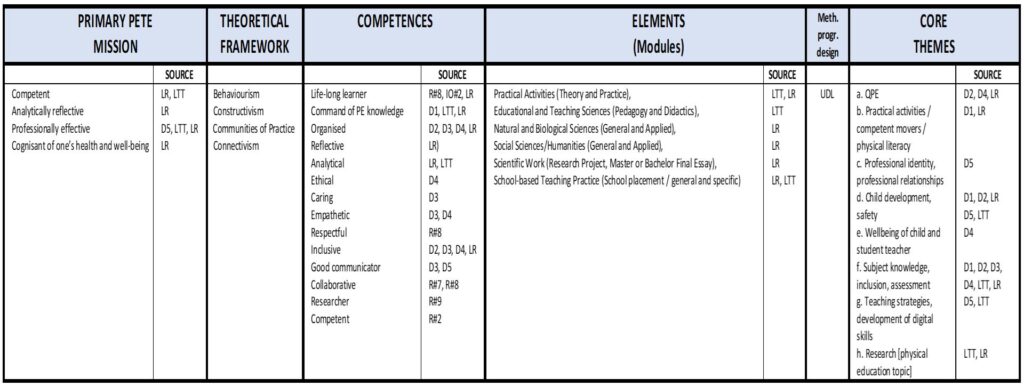
Note: IO#2 Report: LR=Literature Review; LTT= Learning Teaching and Training, #IO1 and #IO3: D1, D2, D3, D4, D5”= Dimensions Round 3 only Delphi Study; UDL = Universal Design for Learning
PRIMARY PETE MISSION
- Prepare candidates at undergraduate level for a successful future as PE educators who build communities of competent, and knowledgeable children on their physically literate journey, who value an active and healthy lifestyle and pursue physical activity.
- The primary PE teacher (generalist or specialist) is seen as a competent professional who is concerned to become more effective in assisting and enabling children’s physical, social and cognitive learning and development within a variety of contexts through analyzing, exploring and reflecting upon the student teachers own classroom practice.
Theoretical framework
LEARNING THEORIES:
- In a single day, a student may engage with behaviourism-inspired videos with mastery quizzes, connect on social media to a community of practice for advice on solving a homework question, use responses to help their construction of understanding of a topic, and post a social media comment where they share their understanding and the resources that helped them.
- Efficient PETE programs balance field-based learning experiences with on-campus opportunities for continued learning and reflection through constructivist-oriented learning strategies that promote reflection and critical thinking.
Core themes
The organisation of the elements of study programmes into themes provides a means of highlighting key aspects for teaching primary PE. These core themes of Quality Physical Education are represented here:
Research on physical education topic
Practical activities / competent movers / physical literacy
Professional identity, professional relationships
Child development, safety
Wellbeing of children and student teachers/ Promotion of PA and healthy lifestyles
Subject knowledge, inclusion, assessment
Teaching strategies, development of digital skills
DIMENSIONS
The table below highlights the dimensions emerged in the present project from IO#1 and IO#3.
PRIMARY PETE degree courses should develop these dimensions and modules/micromodules will be proposed to cover these aspects (IO#5).
|
|
|
|
|
Elements
Primary PETE programmes of study (240/300 ECTS credits over 4-5 years) could be structured to facilitate students passing through 3 phases – foundation (Year 1), extension (Year 2) and specialization (Years 3 & 4):
- Year 1 modules provide a comprehensive introduction to the principles underpinning the study and teaching of PE in Primary Schools;
- Year 2 modules examine in greater depth areas that were raised in Year 1;
- Modules in Years 3 and 4 require students to consider their evolving experience in the programme in general and PE in particular,
- Finally integrating theory and practice in a personal independent dissertational or research project study
Development of fundamental movement skills; broad range of opportunities to extend agility; flexibility and coordination; individually and with others; team games, playground games, co-operative games and games traditional to the school or locality, dance, outdoor activities.
Educational and Teaching Sciences (Pedagogy and Didactics): Knowledge and understanding of pedagogical and didactical processes (knowledge on group/classroom management) and their application in school-related contexts including school culture, curriculum development, implementation and evaluation, effective communication and interaction in a variety of PA and safe learning environment (Modules for improving the teaching-learning competence focused on the pedagogical content knowledge, modules for improving verbal and non-verbal communication);
Subject knowledge and understanding in relevant areas of the natural/biological (life sciences) (General and Applied): Development and understanding of the importance of PA recommendations for children and the significance of learning experiences in PE for lifetime (Modules on children’s overall development, motor development and learning);
Subject knowledge and understanding in relevant areas of social sciences and humanities (General and Applied);
The importance of the role of primary school (PE) teachers for the promotion of PA and healthy lifestyles.
Scientific Work (Research Project, Master or Bachelor Final Essays);
School-based Teaching Practice (School placement /Internship – general and specific): Compulsory PE teaching during the formal school placement. A minimum of 20% of the total time should be allocated for PE teaching practice, which will be appropriately distributed over the duration of the Primary PETE programme.
Methodological design (UDL)
- Universal Design for Learning (UDL) is a framework that guides the design of courses and learning environments to appeal to the largest number of students.
- It underlines flexibility in how instructional material is presented, how students demonstrate their knowledge and skills, and in how they are engaged in learning.
- Use a diversity of teaching methods to eliminate any barriers to learning.
- Anticipate and plan for all the educators making sure that the greatest range of students can access and engage in learning. The fundamental goal of UDL is for all students to become expert learners. Expert learners are purposeful and motivated, resourceful and well-informed, and strategic and goal-directed about learning.
- UDL’s principles of multiple means of engagement, representation, and action and expression offer PETE educators an instructional design model to struggle for equitable access for all students by offering options and sets goals to accommodate diverse learners.
- In addition, UDL encourages PETE educators to consider how they might improve their own teaching practice by considering diversity in the classroom, student voice and intervention.
Conclusions
PRIME PETE project has presented so far, a formalization of a revised primary PE teacher profile that is theory-grounded and outlines key competences and elements detected in a PRIME PETE IO#1 Delphi study undertaken by experts from all over Europe.
Suggestions have been made on teaching methodologies for Prime PETE Program and the development of the Prime Pete course modules and micromodules for IO#5. The assessment of the different modules and micromodules will follow in IO#6.
Finally, the role of (PE) teachers in promoting PA and healthy lifestyles among children in a school context and outside school should be highlighted This suggested theoretical and methodological framework for the PRIME PETE Programme aims to ensure the student graduate will take the first steps towards teaching quality PE.
